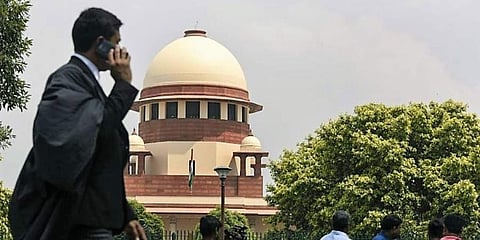

When a State is bifurcated, will a Scheduled Caste person availing of reservation cease to get the same benefit in the newly created State, that is the 'peculiar question' the Supreme Court examined on Tuesday.
The top court said that such a question has cropped up before it for the first time and that there are no case laws available as far as the substance of the case is concerned. Thus, the court said, it would like to examine the matter threadbare as the issue can happen anywhere. It has sought the assistance of Attorney General K K Venugopal, who submitted that reservation in bifurcated States for Scheduled Caste and Scheduled Tribe (SC/ST) would remain the same.
Justices U U Lalit and Ajay Rastogi were faced with the question while examining an appeal filed by Pankaj Kumar, an SC who has challenged the Jharkhand High Court's order of February 24 last year. The high court held that the petitioner cannot avail the benefit of reservation in both Bihar and Jharkhand and hence cannot get qualified for State civil service examination.
Kumar was born in 1974 in the Hazaribagh district of Jharkhand. At the age of 15 in 1989, he shifted to Ranchi, the State capital which came into effect after Bihar's reorganisation on November 15, 2000. He was appointed as an assistant teacher in a school in Ranchi from December 21, 1999, and continued his job as a teacher till 2008 in the same school.
In 2008, Kumar applied for the third Combined Civil Services Exam in Jharkhand and was called for an interview. He has submitted his Caste Certificate dated January 12, 2007, showing him as a resident of Ranchi along with his application for the Civil Services, which showed his 'original residence' as Patna.
Additional Advocate General for Jharkhand, Arunabh Chowdhury, said the State is supporting the majority verdict of the High Court and is of the view that Kumar cannot be allowed to avail the benefit of reservation in both Bihar and Jharkhand. The bench said that it agrees with the contention that people belonging to SC or ST cannot be allowed to avail the benefit of reservation in both States. But, as the caste of Kumar is recognised as Scheduled Caste by both Bihar and Jharkhand, then why can't the benefit be extended to people of both the States, as they may belong to the same clan. It said that sometimes area-specific reservation is given to the SCs or STs; in that case, Parliament clearly specifies that the quota will be given in that particular State.
Chowdhury referred to earlier verdicts of the top court dealing with related issues and a circular said that even if a particular caste is reserved in both the States, the place of permanent residence will hold importance and not the place of temporary residence. He said the court has to take into account that Jharkhand has the highest percentage of Scheduled Tribe population in the country.
The bench said that people belonging to the same caste irrespective of their residence in both the States should get the same benefit like it was given during the unified state. Dealing with Kumar's case, the bench said that he was born and brought up in Hazaribagh and in a way his family tree has two branches one in Patna, the other in Jharkhand. "What is wrong if one branch of a family takes benefit of reservation in Bihar and another branch takes benefit in Jharkhand," the bench said.
The hearing remained inconclusive and would continue on Thursday. Earlier, the top court had asked several questions from the Attorney General on what would happen if a person, whose caste was reserved in a unified State and upon reorganisation of the State; it gets deleted in the successor state.
It had also posed questions like whether a person belonging to Scheduled Caste brought up in Bihar, where he pursued his schooling, higher studies but chooses to take admission in a medical college in Jharkhand, can he avail the benefit of quota. The bench had asked Venugopal to explain that if the reorganisation of a State takes place in which an individual resident of a state has no say, would a person lose his status of Scheduled Caste or Scheduled Tribe, which he had enjoyed in the unified State.
"These are peculiar questions which we are faced with. We don't have any precedent or any case laws. We have to examine these questions as such a situation can arise anywhere," the bench had said.
Venugopal said the question before the court in the present case is whether the petitioner was entitled to be treated as a Scheduled Caste in Jharkhand since his caste which is shown in the two caste certificates is recognised as SC in both the States of new Bihar as well as Jharkhand. He said the two verdicts of the top court -- one of 1990 and the other of 1994, which relate to migration of an individual from one State to another, would have no application to the issue of bifurcation of the State.
The totality of the facts set out would show that it would be wholly unfair to deprive the petitioner of the benefit of reservation as a Scheduled Caste in relation to the Combined Civil Services of Jharkhand, the AG said, adding that the petitioner, in this case, is entitled to the benefit of SC reservation in Jharkhand.
